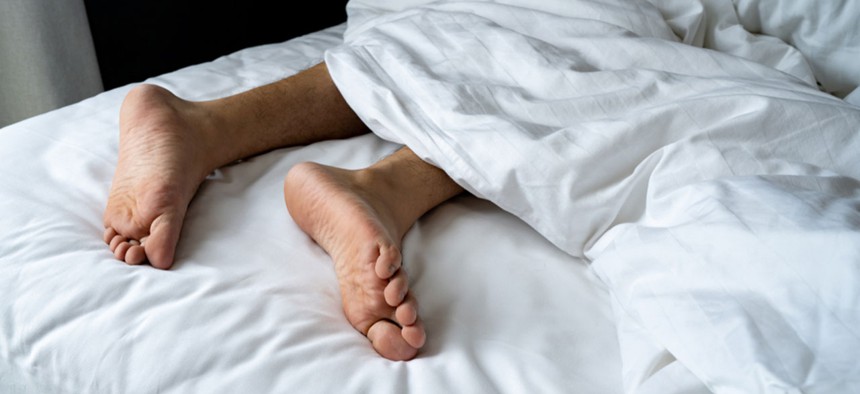
Longchalerm Rungruang/Shutterstock.com
From Charles Darwin to Arianna Huffington, Influential Thinkers Have Long Obsessed Over Sleep
Stressing about rest is a common concern of the highly accomplished among us.
Reaching for the sun and success all day is tiring work, and everyone must occasionally give it a rest, whether insect, animal, plant, or human.
Evolutionary biologist Charles Darwin in 1880 wrote The Power of Movement in Plants, noting that the Colocasia antiquorum, or elephant ear, dozes in the dark. “The leaves of this plant sleep by their blades sinking in the evening…By an early [morning] hour it had assumed its diurnal position.”
Since then, scientists have been able to prove these observations, recording trees’ nighttime activities and confirming that they do indeed sleep. Birch tree branches, for example, droop by about 10 centimeters at night, then lift with the sunrise. In conducting the experiment, scientists used lasers to record the branches’ movement, for fear that light from cameras would disturb the trees’ sleep.
Rest is a delicate business, after all. Creatures need sleep, but we’re easily disturbed. Experiments with fruit flies have shown that a single light pulse jolts the insects’ circadian rhythms out of sync—research that may lead to a cure for jet lag someday.
Likewise, urban trees that stand near street lights die younger because the nighttime illumination disturbs their slumber. And Darwin also observed that stressed plants sleep poorly, writing:
On a warm but stormy evening, the plant whilst being brought into the house, had its leaves violently shaken, and at night not one went to sleep…[B]ut on the ensuing night they rose in the usual manner between 7 and 8 AM.
Stress can have a similar effect on humans. After media entrepreneur Arianna Huffington collapsed from exhaustion, she began a tireless campaign to make America sleep again, plunging into the booming business of less stress and more rest. Huffington’s company, Thrive, is a lifestyle site that also promotes relaxation products, and she’s arguably the world’s chief slumber advocate, even publishing a 2016 book called The Sleep Revolution: Transforming Your Life, One Night at a Time.
Meanwhile, the concern that we’re too busy being busy prompted British-German composer Max Richter to create “Sleep,” an eight-hour symphony during which audience members lie on mattresses. The long lullaby, currently being performed at Spring Studios in New York City beginning in the evening and continuing overnight, was composed in consultation with rest experts.
Attendees are expected to doze as musicians play. The composer tells The New York Times, “Our lives are very data-saturated now. We’re always on our screens.” Richter says he wrote the piece as a kind of protest song for dreamers who are briefly—or, for eight hours, ideally—indifferent to technology, and ignoring their devices.
The concert can be streamed online as well. Mostly, the music is made up of low, soothing tones proven to prompt dozing. In the morning, however, musicians play “a gentle reveille” of high-pitched sounds as the sun climbs the sky.
Richter’s protest doesn’t seem totally successful. Listeners grab their phones first thing after waking up, to capture themselves and the sunrise on camera.
Perhaps audiences would be more relaxed if they had Nokia’s latest gadget—a mattress pad that syncs with an app to promote better sleep. Or maybe it’s best to just stop stressing about resting. As Darwin pointed out about plants, “Much agitation checks for a time their power.”






